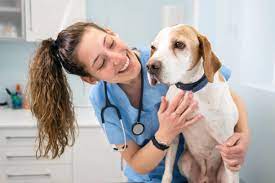As pet owners, we all want to ensure that our beloved companions are healthy, happy and well-cared for. While we may take our pets to the vet for annual check-ups and when they fall ill, we may not fully appreciate the important role that veterinarians play in our pets’ overall health and well-being. In this article, we will explore the vital role of veterinarians in pet health and well-being.
Firstly, veterinarians are trained to diagnose and treat a wide range of health conditions in animals, from common ailments such as ear infections and skin allergies to more complex issues such as cancer and heart disease. This expertise is essential for ensuring that pets receive prompt and effective treatment when they become unwell, and for managing chronic health conditions to improve their quality of life.
Furthermore, veterinarians play a critical role in preventive healthcare for pets. They are able to provide routine check-ups and vaccinations, as well as advise pet owners on good nutrition and exercise habits to keep their pets in optimal health. Preventive healthcare is especially important for pets as it can help to identify and address health issues before they become more serious, thus reducing the risk of costly and potentially life-threatening health problems.
Another key aspect of the veterinarian’s role is in supporting pet owners in making informed decisions about their pet’s healthcare. This includes providing advice on appropriate treatments and medications, as well as discussing end-of-life care options when necessary. Veterinarians are also able to provide guidance on behavioural issues and training, which can help to improve the relationship between pets and their owners.
In addition to their clinical expertise, veterinarians also play a vital role in promoting animal welfare. They are trained to recognize and respond to cases of animal abuse and neglect, and are often called upon to work with animal welfare organizations to provide care and treatment for animals that have been mistreated. Veterinarians also play a role in ensuring that animals are treated humanely in research and testing, and in promoting responsible breeding practices to minimize the risk of genetic disorders and health problems in pets.

Beyond their work in clinical settings, veterinarians also play an important role in public health. They are trained to recognise and respond to zoonotic diseases – those that can be transmitted from animals to humans – and to work with public health officials to prevent outbreaks and manage cases when they occur. Veterinarians are also involved in food safety, ensuring that the animals we consume are healthy and free from disease.
Despite their critical role in pet health and well-being, veterinarians face a number of challenges in their work. One of the biggest challenges is managing the emotional and psychological impact of their work. Veterinarians are often called upon to make difficult decisions about end-of-life care for pets, and may have to deliver bad news to pet owners. This can be emotionally draining, and veterinarians must learn to manage their own emotions while providing compassionate care to both pets and their owners.
Another challenge faced by veterinarians is the cost of providing care. As with human healthcare, the cost of veterinary care can be significant, and many pet owners may struggle to afford the treatment that their pets need. This can be especially challenging when pet owners are faced with unexpected veterinary bills, such as those associated with emergency care.
In addition to these challenges, the field of veterinary medicine is constantly evolving, and veterinarians must keep up-to-date with the latest research and techniques to provide the best possible care for their patients. This requires a significant investment of time and resources, as well as a commitment to ongoing professional development.

Despite these challenges, the role of veterinarians in pet health and well-being remains essential. Through their clinical expertise, preventive healthcare, support for pet owners, and promotion of animal welfare, veterinarians help to ensure that our beloved pets are healthy, happy and well-cared for. Whether we
own cats, dogs, birds, or other pets, we can all benefit from the expertise and dedication of the veterinary profession.
One important way in which veterinarians promote animal welfare is through their work in animal rescue and rehabilitation. Many veterinarians are involved in organisations that rescue and care for animals that have been abandoned, abused, or neglected. These animals may require medical treatment, rehabilitation, and behavioural training to help them recover from their experiences and find loving homes.
Veterinarians also play a role in promoting responsible pet ownership. They are able to advise pet owners on the importance of spaying and neutering to control pet populations, and on the risks associated with owning exotic pets or breeds that are prone to health problems. They can also provide guidance on how to keep pets safe from common hazards such as toxic substances, and how to manage pet behavior to reduce the risk of accidents and injuries.

Another important aspect of the veterinarian’s role is in providing education and outreach to the public. Many veterinarians are involved in community education programmes, providing talks and workshops on topics such as pet health, nutrition, and behaviour. They may also work with schools and youth organisations to promote responsible pet ownership and animal welfare, and to inspire young people to consider careers in veterinary medicine.
Finally, veterinarians play an important role in advancing our understanding of animal health and well-being. Through their work in research and academia, veterinarians are able to contribute to our knowledge of animal diseases, behavior, and genetics, as well as the development of new treatments and technologies. This research is essential for improving the health and welfare of animals, and for advancing our understanding of the complex relationship between animals and humans.
conclusion,
the role of veterinarians in pet health and well-being is essential. Through their clinical expertise, preventive healthcare, support for pet owners, promotion of animal welfare, and public education and outreach, veterinarians play a critical role in ensuring that our beloved pets are healthy, happy and well-cared for. While the veterinary profession faces a number of challenges, including emotional stress, cost constraints, and ongoing professional development, it remains a vital and rewarding career path for those who are committed to improving the lives of animals and their owners.





Discussion about this post